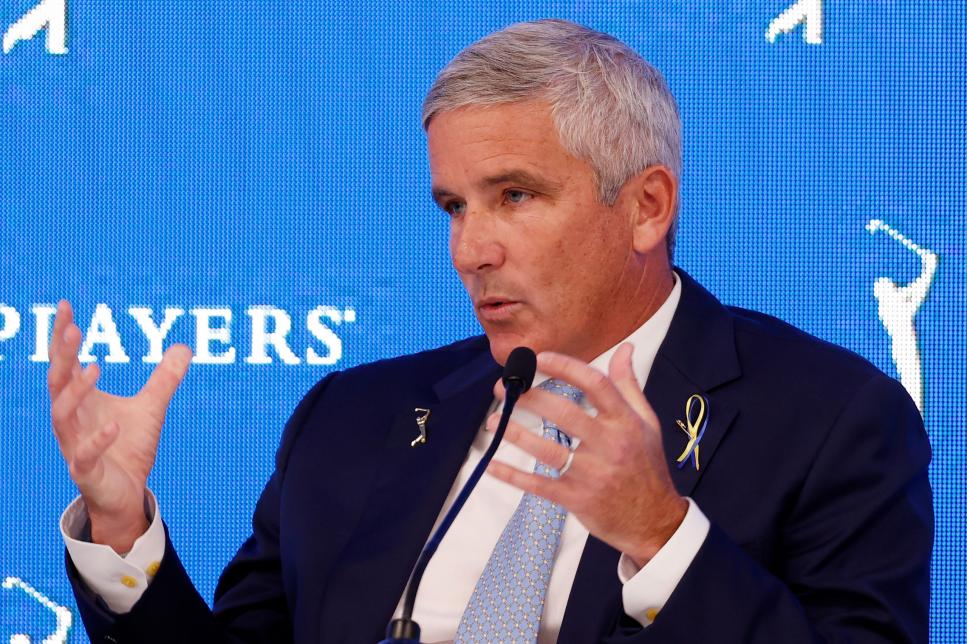Jon Rahm turned speculation into reality on Thursday, as the reigning Masters champ announced he was signing with LIV Golf. The tremors from the move could be felt for years to come, and possibly reignite tensions between the PGA Tour and the Saudi-backed circuit as the two sides navigate potential peace in golf's civil war.
With so much to suss out, here are nine lingering questions regarding the Spanarid’s jump to LIV:
What spurred Jon Rahm’s reversal?
There’s no need to relitigate all of Rahm’s previous remarks regarding LIV Golf, because the message in all those comments was consistent: He had no interest, because he didn’t care about the money and didn’t like the format. So believing those words were true … what happened? Could it simply be about his bank account and reports of anywhere from $300 million to $600 million to sign with LIV? Was he angered by the framework agreement, thinking Saudi money would likely be in the game in one way or another? Or, as we reported earlier this week, is Rahm’s umbrage that strong regarding his perceived treatment by the PGA Tour and the golf establishment—chiefly, that he’s not treated like the star that he is—that he’s willing to gamble his reputation, legacy and future for the chance to be the de facto face of LIV?

Photo courtesy of LIV Golf
What does this mean for Rahm’s reputation?
Given the PGA Tour’s surprise framework agreement with Saudi Arabia this summer, Rahm will likely not face the same degree of blowback for partnering with the problematic kingdom as other LIV defectors … but there will be criticism for taking money from a regime accused of numerous human-rights atrocities. Rahm’s bigger issue, however, could be looking like a hypocrite. He’s not the first LIV player to say one thing then do another (Dustin Johnson, Brooks Koepka, Bryson DeChambeau, Henrik Stenson, you get the idea) but Rahm was adamant he was staying with the tour. And once a man breaks his word it’s hard to take his other words seriously, but assuming Rahm’s previous sentiments came from the heart … well, Faustian bargains can be a tough swallow for his fans. Rahm has become one of the more respected individuals by those inside the ropes and out, but his decision could cost him that standing with the golf populace.
Does Rahm’s departure signal a new wave of defections?
Even before Rahm’s rumored defection there were a number of high-profile names attached to LIV as the fledgling league heads into its third season. Sources have told Golf Digest that Rahm might not just get his own team, but that LIV could create another club to accommodate a potential exodus from the PGA and DP World Tours. It would be easy to dismiss this speculation given LIV’s past track record with proclamations about alleged defections, but Rahm’s leap and the changing landscape brought by the framework agreement instills a sense of plausibility that this time could be different.
What does this do to the Ryder Cup?
Underline, highlight, bold the following: No chance European captain Luke Donald is going to go into Bethpage in 2025 without Rahm, who's been a tour de force at the last two events. If Rahm is allowed to play, does that bring in other LIV members like Sergio Garcia to the roster and increase the likelihood that past stars in Henrik Stenson, Ian Poulter and Lee Westwood could one day captain? Team Europe stood on principle this past year by not allowing the defectors to play (while the United States did allow Brooks Koepka on the team), but between the ongoing negotiations with PIF, the PGA and DP World tours and Rahm’s decision, it sure seems like LIV will be entrenched in future Ryder Cups.

Patrick Smith
What does this mean for the PGA Tour’s deal with Saudi Arabia’s Public Investment Fund?
For the past two weeks sources have told Golf Digest that PIF looks at Rahm as a bargaining chip amid worries the PGA Tour will ultimately walk away from the proposed framework agreement, the belief being that the tour could not afford to lose someone as valuable as Rahm. With Rahm in tow, it certainly bestows leverage in PIF’s corner and could force the tour to accelerate its deal with PIF to minimize collateral damage. That option is on the table. Conversely, there are a number of voices with the tour that deem Rahm’s separation as an act of war and that it violated an unspoken agreement between the two parties (since the no-poaching clause was eliminated from the deal due to antitrust regulations). So, in spite of the outside belief this could force the sides together, it could do the opposite. The ball is truly in the tour's court to prevent this schism from spiraling further out of control, but it is unclear if decision-makers with the tour have any hunger for cooperation after Rahm's exit.
What does this mean for LIV Golf?
The signing of Rahm is a heist, no doubt. He is arguably the best player in the sport and his affiliation with LIV confers an air of seriousness and legitimacy it clearly lacks. In that same breath, Rahm doesn’t have the popularity of Phil Mickelson, Bryson DeChambeau, or even Brooks Koepka, so if those players failed to help LIV capture an audience, is it reasonable to expect Rahm to turn that ship around? And if Rahm doesn’t produce immediate dividends, what is the future of LIV Golf? Granted, given the reported hundreds of millions LIV gave Rahm, this is not a sports business—at least a business that makes fiscal sense. At worst, it’s a propaganda arm of a government willing to write a blank check to advance its socio-economic perception, and in its current form, it’s an exhibition circuit with a half-dozen stars and 40-something has-beens, never-wases and rank-and-file names. Rahm could make LIV be more than that, but it's far from a given. As one insider told Golf Digest, arguably LIV's best path toward the horizon is to continue to play the waiting game against the PGA Tour, picking-off aggrieved or former household names to the point where the tour ceases to exist. Which—at this point—is not out of the realm of possibility. Speaking of which …

Cliff Hawkins
What does this mean for the PGA Tour?
The tour will go on, and as the past two years have shown there are plenty of players willing and able to step into the void. But these are the facts: Three of the past five major winners now play at LIV Golf. LIV also has Mickelson, who in spite of his fall from grace remains beloved by a contingent of fans, and DeChambeau, one of the game’s biggest attractions. The tour is also battling an uprising of sorts among its membership regarding its current negotiations along with the new changes to the tour’s infrastructure. Oh, and there is sponsorship and tournament backlash regarding some of the new implementations. The outside perception is the tour does not have its house in order and is perhaps at its weakest point since the schism began ... and the tour has done little to prove otherwise.
What does this mean for PGA Tour commissioner Jay Monahan?
Speaking last week at the New York Times DealBook Summit in New York City, Monahan asserted his belief that he’s the right man for the job. It may not be his call. To be fair, Monahan was not waging a fair fight, his company against a foreign country. That does not change the fact that the organization he was supposed to protect caught on fire during his watch, and his response could best be described as calling the fire department to let them put the flames out. Ever since his leave of absence due to a medical issue, rumors have been flying about a potential successor to Monahan, particularly once the negotiations with PIF and private-equity investors ends. Losing Rahm will now be seen as another misstep in a line of mistakes that may not afford Monahan the chance to finish the deal. The question is not how he responds; it’s if he gets the chance to.
Who steps up for the PGA Tour?
If Monahan does stick around, it clearly won’t be him, as he’s been far from front-and-center (to put it mildly) over the past two years. It likely won’t be Rory McIlroy; he already stood up for what he believed was right in the absence of true tour leadership, and for his service he was sold out by the very thing he was trying to defend. Scottie Scheffler is Rahm’s equal on the course, but has yet to show any desire to lead a public charge against LIV. Jordan Spieth took McIlroy’s role on the policy board, although Spieth’s been noticeably absent behind the mic the past two years on the schism subject. That means the onus could fall on Tiger Woods. Alas, Woods—even with his ambitious forecast for his latest comeback—will not be a constant, week-to-week presence. The tour could have a major messaging issue, and like many of the problems it’s facing, there is no easy answer.







